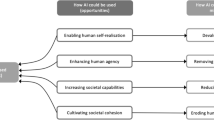Abstract
The disillusion with social science evaluation can be partly attributed to an overly narrow view of the function of evaluation. In the accepted model, evaluation functions to provide information needed by rational decision-makers for discrete decisions. But evaluations often cannot perform this function. However, evaluation often does serve other functions. In one such function, it acts as a means for managing conflict and promoting social change. It often also stimulates program staff to critically examine their assumptions and behavior. Consideration of these additional functions leads to suggestions for changes in recruitment of evaluators and in the definition of the evaluators' role. Finally, one can view evaluation as a societal ritual whose function is to calm the citizenry and to perpetuate an image of government rationality.
Similar content being viewed by others
References
Alkin, Marvin C. (1969). “Evaluation Theory Development,” Evaluation Comment, 2: 2–7.
Arnold, Thurman W. (1935). The Symbols of Government. New Haven: Yale University Press.
Berke, Iris, Elaine French, Susan Heck, Michael Kirst and Stephen Weiner (1976). The Impact of State Mandated Evaluation Procedures upon the Educational Programs of Local School Districts in California. Report submitted to the California State Board of Education, Stanford University, 1976.
Campbell, D. T. and A. Erlebacher (1970). “How Regression Artifacts in Quasi-Experimental Evaluations can Mistakenly Make Compensatory Education Look Harmful,” pp. 185–210, in J. Helmuth (ed.), Compensatory Education: A National Debate, Vol. III. The Disadvantaged Child. New York: Brunner/Mazel.
Cohen, David (1975). “The Value of Social Experiments,” pp. 147–176, in Alice M. Rivlin and P. Michael Timpane (eds.), Planned Variation in Education: Should We Give Up or Try Harder? Washington, D.C.: The Brookings Institution.
Cohen, David and M. Garet (1975). “Reforming Educational Policy with Applied Social Research,” Harvard Educational Review, 45: 17–43.
Cyert, Richard M. and James G. March (1963). A Behavioral Theory of the Firm. Englewood Cliffs: Prentice-Hall.
Downs, Anthony (1971). “The Issue-Attention Cycle and Improving our Environment.” Typescript. Chicago: Real Estate Research Corporation.
Ellul, Jacques (1965). Propaganda: The Formation of Men's Attitudes. New York: Knopf.
Elmore, Richard F. (1975). “Design of the Follow-Through Experiment,” pp. 23–46, in Alice M. Rivlin and P. Michael Timpane (eds.), Planned Variation in Education: Should We Give Up or Try Harder? Washington, D.C.: The Brookings Institution.
Elmore, Richard F. (1972). “The Politics and Administration of an Educational Experiment: The Case of Follow-Through.” Special Qualifying Paper. Cambridge, Mass.: Harvard University Graduate School of Education.
Floden, Margret B. (Buchmann) (1974). “Some Remarks on Social Experimentation.” Unpublished paper. Stanford University.
Gilbert, John P., Richard J. Light and Frederick Mosteller (1976). “Assessing Social Innovations: An Empirical Base for Policy,” in Carl A. Bennett and Arthur A. Lumsdaine (eds.), Evaluation and Experiment. San Francisco: Academic Press.
Gramlich, Edward M. and Patricia P. Koshel (1975). Educational Performance Contracting: An Evaluation of an Experiment. Washington, D.C.: The Brookings Institution.
Hitch, Charles, J. (1970). Decision-Making for Defense. Berkeley: University of California Press.
Horowitz, Irving Louis and James Everett Katz (1975). Social Science and Public Policy in the United States. New York: Praeger Publishers.
McLaughlin, Milbrey W. (1975). Evaluation and Reform. Cambridge, Mass.: Ballinger.
Orlans, Harold (1971). “The Political Uses of Social Research,” American Academy of Political and Social Scientists, 394: 28–35.
Popham, W. James (1975). Educational Evaluation. Englewood Cliffs: Prentice-Hall.
Provus, Malcolm M. (1971). Discrepancy Evaluation. Berkeley: McCutchan.
Riecken, H. W. and R. F. Boruch (eds.) (1975). Social Experimentation. New York: Academic Press.
Rivlin, Alice M. (1971). Systematic Thinking for Social Action. Washington, D.C.: The Brookings Institution.
Rivlin, Alice M. and P. Michael Timpane (1975). Planned Variation in Education: Should We Give Up or Try Harder? Washington, D.C.: The Brookings Institution.
Schultze, Charles L. (1968). The Politics and Economics of Public Spending. Washington, D.C.: The Brookings Institution.
Smith, Eugene R. and Ralph W. Tyler (1942). Appraising and Recording Educational Progress. New York: Harper & Brothers.
Speizman, William (1974). “Evaluation: An Evaluation from a Sociological Perspective,” pp. 192–210, in C. Wayne Gordon (ed.), Uses of the Sociology of Education. The Seventy-Third Yearbook of the National Society for the Study of Education. Part II. Chicago: University of Chicago Press.
Stake, R. E. (1967). “The Countenance of Educational Evaluation,” Teacher's College Record, 68: 523–540.
Steinbruner, John D. (1974). The Cybernetic Theory of Decision: New dimensions of Political Analysis. Princeton: Princeton University Press.
Stufflebeam, Daniel L., Walter J. Foley, William J. Gephart, Egon G. Guba, Robert L. Hammond, Howard O. Merriman and Malcolm M. Provus (1971). Educational Evaluation and Decision Making. Ithaca, Ill.: F. E. Peacock.
Truman, David B. (1951). The Governmental Process: Political Interests and Public Opinion. New York: Alfred A. Knopf.
Williams, Walter and John Evans (1969). “The Politics of Evaluation: The Case of Head Start,” The American Academy of Political and Social Science Annals, 385: 118–132.
Author information
Authors and Affiliations
Additional information
The Stanford Evaluation Consortium is supported by a grant from the Russell Sage Foundation. Robert E. Floden is Assistant Professor of Education at Michigan State University. Stephen S. Weiner is Assistant Professor of Education at Stanford University.
Rights and permissions
About this article
Cite this article
Floden, R.E., Weiner, S.S. Rationality to ritual: The multiple roles of evaluation in governmental processes. Policy Sci 9, 9–18 (1978). https://doi.org/10.1007/BF00137976
Issue Date:
DOI: https://doi.org/10.1007/BF00137976




